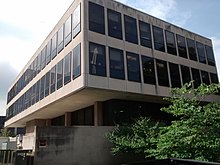The Institute for Nuclear Studies was founded September 1945 as part of the University of Chicago with Samuel King Allison as director. On November 20, 1955, it was renamed The Enrico Fermi Institute for Nuclear Studies. The name was shortened to The Enrico Fermi Institute (EFI) in January 1968.
 | |
| Established | 1945 |
|---|---|
Field of research | Astrophysics Cosmochemistry Particle physics Relativity |
| Director | Scott P. Wakely |
| Location | Chicago, Illinois, United States 41°47′34″N 87°36′09″W / 41.7929°N 87.6026°W |
Operating agency | University of Chicago |
| James Cronin Enrico Fermi Walter Libby Maria Goeppert Mayer Yoichiro Nambu Harold C. Urey | |
| Website | efi |
Physicist Enrico Fermi was heavily involved in the founding years of the institute, and it was at his request that Allison took the position as the first director.[1] In addition to Fermi and Allison, the initial faculty included Harold C. Urey, Edward Teller, Joseph E. Mayer, and Maria Goeppert Mayer.[2]
Research activities
edit- Theoretical and experimental particle physics;
- Theoretical and experimental astrophysics and cosmology;
- General relativity;
- Electron microscopy;
- Ion microscopy and secondary ion mass spectrometry;
- Nonimaging optics and solar energy concentration;
- Geochemistry, cosmochemistry and nuclear chemistry.
Notable staff
edit- Herbert L. Anderson, nuclear physicist
- James Cronin, Nobel laureate in physics
- Enrico Fermi, Nobel laureate in physics
- Riazuddin, nuclear physicist
- Robert Geroch, general relativist
- James Hartle, general relativist
- Craig Hogan, astronomer
- Faheem Hussain, string theorist
- Leo Kadanoff, condensed matter physicist
- Edward Kolb, cosmologist
- Willard Libby, chemist
- Emil Martinec, string theorist
- Joseph E. Mayer, chemist
- Maria Goeppert Mayer, Nobel laureate in physics
- Yoichiro Nambu, Nobel laureate in physics
- Marcel Schein, cosmic ray physicist
- John Alexander Simpson, nuclear and cosmic ray physicist
- Edward Teller, nuclear physicist, father of the hydrogen bomb
- Michael Turner, cosmologist
- Harold C. Urey, Nobel laureate in chemistry
- Carlos E.M. Wagner, particle phenomenologist
- Robert M. Wald, general relativist
- Gregor Wentzel, quantum physicist
See also
editReferences
edit- ^ Allison, S. K.; Segrè, Emilio; Anderson, Herbert L. (1955). "Enrico Fermi 1901–1954". Physics Today. 01 January 1955 (1): 9–13. Bibcode:1955PhT.....8a...9A. doi:10.1063/1.3061909.
- ^ Kleppa, Ole J. (January 1997). "The Institute for the Study of Metals: The First 15 Years" (PDF). The Journal of the Minerals, Metals & Materials Society. 49 (1): 18. Bibcode:1997JOM....49a..18K. doi:10.1007/BF02914621. S2CID 108928306. Archived from the original (PDF) on 2018-08-01. Retrieved 2019-02-11.